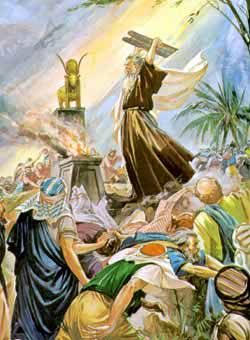You don’t need me to tell you 2020 has been a difficult year. On top of the world stopping Coronavirus that overhauled how we work, educate, socialize, and even show our faces – we’ve suffered devastating forest fires, murder hornets, confrontational social/political upheaval, and the worst unemployment since the Great Depression. Well, if that weren’t enough, today (as of this publishing) starts the ominous Three Weeks.
Rooted in the Torah, the Three Weeks is a period of the Jewish calendar associated with tragic events that have occurred throughout Jewish history specifically during this time of year. Such events as the expulsion of Jews from Spain and England, bombing of Jewish communities in Buenos Aires, and others. Also tensions in the homeland tend to flare up around this time as I have written about from personal experience. The Three Weeks starts on the 17th of Tammuz (the date of this posting) where we begin to lessen our joy and observe customs similar to the mourning process; we don’t shave or get haircuts, we don’t listen to live music, and we don’t have parties or weddings. Then it gets more intense with the final 9 days and finally culminates with the fast of Tisha B’Av (the 9th day of the month of Av.)
Despite all this mourning and guilt, I actually believe this whole process, and especially today, the 17th of Tammuz in particular, holds the key to an extraordinary opportunity for turning it all around. So what’s the deal with the 17th of Tammuz? The Rabbis give 5 reasons.
- The daily offerings in the first Temple were discontinued due to the siege of Jerusalem.
- The walls of the city of Jerusalem were breached by the Romans during the second Temple period.
- Apostomos, a Roman soldier, publicly burnt a Torah scroll.
- An idol was placed in the Temple.
The fifth reason, which is what I want to focus on, is the cause of the other four. The story goes like this. The entire Jewish nation, having just witnessed the revelation of God at Mt. Sinai, sends Moses up the mountain to learn the rest of the Torah for 40 days from God personally. Due to a miscalculation of those 40 days, Moses doesn’t come back down the mountain when the Jews expected him to and they panic believing he is dead. Next thing you know, they’re flagrantly transgressing the 2nd Commandment as they worship and celebrate the infamous Golden Calf.
Moses finally comes down the mountain holding the two tablets and sees the blasphemous debauchery. In his shock (or perhaps his wisdom), he throws down the tablets shattering them. That event happened on the 17th of Tammuz.

Losing the original tablets was a tragedy. Unlike the rocky, chiseled, second tablets we’re all familiar with, the original tablets were carved by God Himself. The Rabbis say that they could be viewed from any angle and read clearly, and the writing pierced the whole tablets while letters like a ס or a ם stayed perfectly in place. (Even though their centers would have fallen out if the writing pierced all the way through). And once a Jew learned from the original tablets, there was no forgetting. Perfect retention and recollection every time.
When we finally do get Moses’ second tablets it is 80 days later… on Yom Kippur. There is a connection between these two days. Though Yom Kippur is the day of atonement, it’s really about a closeness with God that is unlike any other day. Clearly, the day that was originally meant for the tablets must have been intended to contain that same closeness. The betrayal of the Jews with the Golden Calf perverted that intended original date, however the seeds of Yom Kippur start on the 17th of Tammuz.
For 40 days we go into a period of resigned reflection as God withdraws, so to speak, showing us the truer consequences of our actions (that God normally would protect us from). Then after the month of Av is over, we get to Elul, and for 40 days, He returns to us in fuller force, helping us make the changes this earlier period has hopefully awoken and inspired us to make. Then finally on Yom Kippur we obtain the gift that was meant for today.
Or you could skip all that and make your teshuvah now. In a year that is screaming, “make a change,” a culture that’s demanding it, and a rise of anti-semitism that may usher it in one way or another, saying “I probably should change X… but… would it really make a difference?” I’m saying emphatically yes. We have an opportunity to spare ourselves all the pain and difficulty meant for these coming weeks by spearheading that change now. God’s not a sadist and the fasting isn’t about getting a slim waistline. It’s about waking up. As Rabbi Akiva puts it in Pirkei Avos 1:14, “If not now, when?”





Pingback: Three Weeks of sadness but also of hope – Immanuel Verbondskind – עמנואל קאָווענאַנט קינד·